On Sept. 15, RSVP AmeriCorps Seniors is hosting its 31st annual Senior Source Health & Information Fair. This fair will be open from 10 a.m. to 2:30 p.m. at the Richland Mall in Waco, TX, and will give seniors opportunities to learn about and take action for their personal health.
This year, RSVP AmeriCorps Seniors will offer multiple free health screenings to participants, alongside free flu shots and COVID-19 immunizations with I.D. and either Medicare or an insurance card. At the fair, other exhibitors will share up-to-date information for senior adults, caregivers, and the general public about their personal health.
The Health & Information Fair currently has open tables for new exhibitors. If interested in exhibiting at the fair or for general questions, contact RSVP AmeriCorps Seniors at (254) 299-8766 or visit https://americorps.gov/.
Participants at the fair are responsible for medical advice and screening administered at the event and should consult with a physician for further evaluation.
Written by: Robin Layton
As Americans regroup after two years of a pandemic lifestyle, studies are revealing that youth who are in the sexual and gender minority are experiencing depression and anxiety at a faster rate than other groups.
In fact, The Trevor Project 2022 National Survey on LGBTQ Youth Mental Health found that “45% of LGBTQ youth seriously considered attempting suicide in the past year,” with 60% of the youth who wanted mental health care in the past year unable to access it. The survey also found that 73% of LGBTQ youth reported having symptoms of anxiety.
Being an LGBTQ young person, unfortunately, means that during their critical adolescent years, they can often feel isolated and misunderstood, lacking the resources they need to maintain their mental health.
With pandemic-related measures in place across the country, youth are at an even greater risk of social isolation and depression. But online resources, including supportive and educational materials, can help them maintain mental and emotional health.
In a Catch-22, the internet can make this necessary information accessible, but only if you have access to the internet.
In this guide, Allconnect researchers take a look at available online resources, as well as address the digital divide and homeless issues within the LGBTQ youth community.
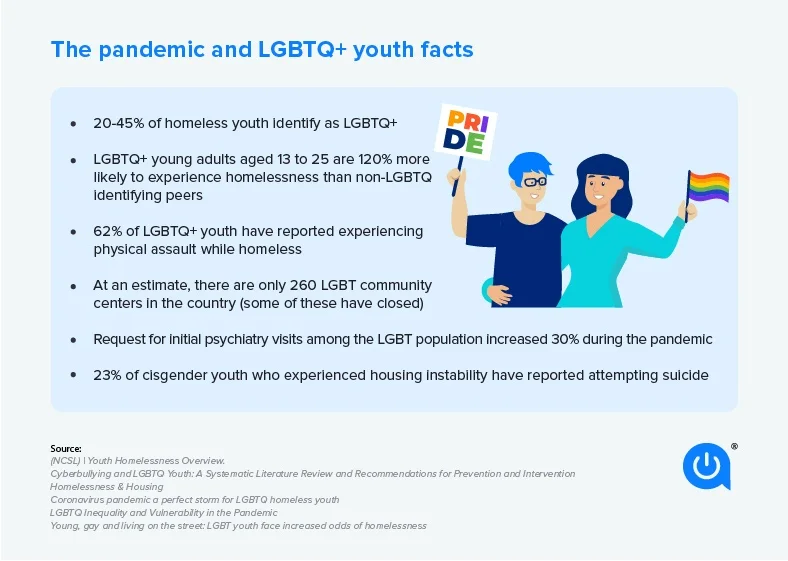
LGBTQ youth can face some unique challenges, such as higher rates of depression and suicide than their peers. A behavioral health report on youth.gov noted that suicide is the third leading cause of death among youth and young adults, and up to 33% of LGBTQ youth report having attempted suicide. LGBTQ high school students are also two to seven times more likely to commit suicide than their peers.
Along with all the pressures of growing into their own identities, they have increased risks of alcohol and drug use, bullying, peer pressure, depression, suicide attempts and high-risk sexual activities. LGBTQ youth and young adults may be kicked out of their homes, and often face homelessness.
Identifying as LGBTQ doesn’t cause depression or mental health issues. The cause is rooted within outside factors: Discrimination, family rejection, negative biases and bullying and hostile microaggressions that can lead to suicidal ideation, according to the report. When LGBTQ youth aren’t accepted for who they are, they have higher rates of stress, anxiety, depression, self-harm behaviors and other disturbances to mental health.
In addition, many LGBTQ youth are confronted with online bullying. Pre-pandemic, 32% of teens aged 14-17 spent about four hours in front of screens. As of June 2020, that number leaped to 62%, according to a Statista report.
Cyberbullying has made the internet a dangerous place for LGBTQ youth, and approximately 48.7% of LGBTQ students are victims of cyberbullying each year. This can be through private text messages or public posts on social media. Cyberbullying leads to high rates of psychological and emotional distress for LGBTQ+ youth, as well as low self-esteem, social isolation, depression and thoughts of suicide.
Other resource and advocacy groups
- The National Coalition of Anti-Violence Programs – The program offers direct services to survivors of all forms of violence and their circle of family and friends. They also work on policy and advocacy, and provide “free, holistic legal services to LGBTQ and HIV-affected survivors in all five boroughs of New York City in Family Court, Housing Court, Civil Court and with immigration matters.”
- GLAAD LGBTQ Resource List – GLAAD shares stories from the LGBTQ community and this list includes resources in politics, military, aging, legal and other sectors.
- The TrevorLifeline – Provides a national crisis intervention and suicide prevention lifeline for LGBTQ youth.
- Homelessness Help – Provides resources for homeless LGBTQ individuals in crisis, as well as provides a reporting platform for housing discrimination or violations.
- National Runaway Safeline – A hotline for youth who need someone to hear them, as well as for concerned adults.
- The LGBT National Youth Talkline – Free and confidential peer support for LGBTQ youth 25 and under.
- Trans Lifeline – Run by trans people, this lifeline provides peer support.
- National Suicide Prevention Lifeline – Free and confidential support for anyone in distress, suicide prevention and resources.
- TheRecoveryVillage.com – A free web resource that provides information about addiction, eating disorders and mental health issues.
- Drug Rehab USA – An accurate directory of LGBTQIA+ friendly drug and alcohol rehabilitation centers in the US
- Grow Resolve – Includes information like articles on substance use being more common in LGBTQ+ populations, ways to find local peer-led and queer-affirming support groups, guides to building a sober-supportive lifestyle, searches to finding insurance covering LGBTQ-affirming care, and tips on building sober-support networks
- Social Media Victims – An in-depth guide about the link between social media use and suicide as well as how you can assist a friend or child if you think they are suicidal.
Big changes are coming for Medicaid recipients! People who are on Medicaid must take action now to preserve their benefits or find new health insurance.
Tory Schafer of Highview Insurance sat down with Meg Wallace of Mobilize Waco to explain these important changes. Meg asked Tory questions as though she were a Medicaid recipient who has been hearing about changes in Medicaid.
~~~~~~~~
Meg: I keep hearing about people getting a letter saying they need to renew their Medicaid. What is this all about?
Tory: Medicaid has income and asset limits. You have to stay within those limits to maintain eligibility in the program. The state periodically needs to review your finances to be sure you’re still eligible.
M. I’ve gotten a letter like this more than once in the past couple of years, and when I called Medicaid they said don’t worry about it. Has something changed?
T. Yes. During the pandemic millions of people lost their jobs in a short amount of time, and the government was concerned about people losing health insurance. So during the Covid Public Health Emergency, the government paused disenrollment in Medicaid. As long as the Covid Public Health Emergency lasted, people wouldn’t have to provide their financial information and recertify. They could stay on Medicaid without doing that.
The Covid Public Health Emergency is ending this spring, so Medicaid will start what is called redetermination. That means Medicaid will once again need to review your finances to see if you’re still eligible. They are starting this process now!
M. So I need to watch for this letter!
T. If you haven’t received a letter about your Medicaid recently, you need to make sure Health and Human Services has your correct address. At YourTexasBenefits.com you can see if they have your current address on file and update it if you need to.
M. OK, I’ll check on that. Then, when I get the letter about my Medicaid, what do I do next?
T. Follow the instructions in the letter to reapply for a new period of benefits. The letter should tell you what you need to submit and how to submit it.
But even if you don’t get a letter, if you receive Medicaid, you need to take care of this, and there are people in Waco who can help.
M. Oh, thank goodness, because this stuff gets confusing. Who can help me if I need help?
T. In the Waco area, Heart of Texas Goodwill and Shepherd’s Heart will have staff assigned to help people submit their information. Call Heart of Texas Goodwill at 254-753-7337 or Shepherd’s Heart at 254-213-7833.
M. Thank you. I’m writing that down now! This change is going to affect so many people. Should we be worried?
T. Yes, we should. If people don’t follow through with this process, they will lose their Medicaid benefits. So please spread the word. If you know anyone on Medicaid, let them know they must recertify this time around.
Many people will still qualify for Medicaid, but some people will find out they’re no longer eligible.
M. Yikes! Who might that happen to?
T. Four groups of people are likely to find out they’re no longer eligible.
First, adults who were briefly unemployed during the pandemic and began receiving Medicaid as a result may have income now, so they won’t be eligible for Medicaid anymore.
Second, women who received pregnancy Medicaid during the pandemic and have since given birth will no longer be eligible.
Third, young adults who were on children’s Medicaid at the start of the pandemic and who have since turned 19 are now too old for children’s Medicaid.
Fourth, children who were receiving children’s Medicaid during the pandemic because their parents’ income was lower, may become ineligible because their parents’ income is too high now.
M. Wow. That’s a lot of people. What can they do if they aren’t eligible for Medicaid anymore?
T. It depends. Some people will be eligible for other health insurance programs, and some will not. But many people don’t even try to get health insurance because they think it’s too expensive or they won’t be eligible. This is a big mistake.
If you’re eligible for employer-paid benefits, your first step is to talk to the person in charge of benefits where you work. Your special enrollment period may last only 60 days after you lose Medicaid.
If you can’t get affordable health insurance through your employer, there’s a good chance marketplace insurance will work for you. Right now, because of new federal funding, more people than ever before who have limited income are eligible for ACA insurance with premiums less than $20 per month, and with low or no deductibles or copays.
If you can’t get coverage in one of those two ways, there are also local options such as Indigent Health Care and the Waco Family Medicine Good Health Card.
M. I had no idea there were so many possibilities. Who can help me look at my options?
T. We’ve built a website called Unlock Healthcare, at www.unlockhealth.care, to provide information about these health insurance programs, along with contact information for local people who can help.
M. OK. So I think it’s going to be all right. I just need to follow through.
T. That’s right. There really are a lot of good options. But now is the time to take action.
~~~~~
Tory Schafer is the owner of Highview Insurance and the primary builder of Unlock Healthcare.
Meg Wallace is the organizer and director of Mobilize Waco, formerly known as the Amberley Collaborative. Mobilize Waco is a disability justice coalition that works toward full participation and leadership by people with disabilities in the Waco area.
Dec. 14 marks the one-year anniversary of the FDA’s authorization of COVID-19 vaccines for emergency use. For the first time since the pandemic began, the United States was able to have a proactive response to protecting people from the Corona virus.
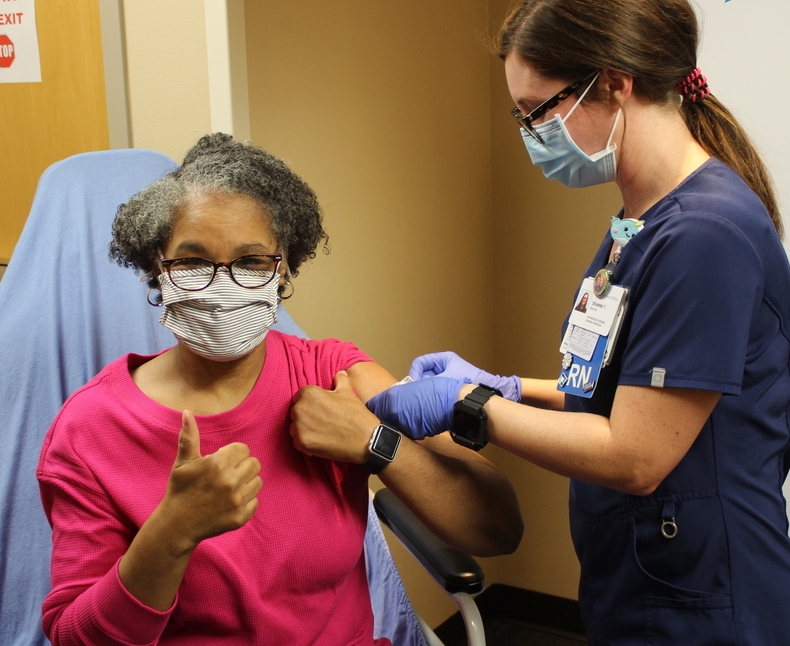
“This is a day to reflect on the marvel that it is that a year after the emergence of this new virus that vaccines could be developed, tested and deployed that are remarkably effective and safe,” said Dr. Farley Verner, health authority for Waco-McLennan County Public Health District. “And now over the year that these vaccines have been in use it is likely that over 200,000 deaths and untold numbers of hospitalizations have been prevented in the United States alone.”
The local public health district received the first shipment of 200 doses of the Moderna vaccine Dec. 23, 2020, and began vaccinating first responders. Since that time, the health district has administered 64,006 doses of vaccine through mass vaccination clinics, drive-through clinics, mobile clinics, and its main clinic.
Currently, 51% of McLennan County residents ages 5 and up are fully vaccinated.
The health district offers the Johnson & Johnson, Moderna, and Pfizer vaccines Monday through Friday at the main clinic (225 W. Waco Dr.) and at mobile clinics throughout McLennan County. You can find the schedule at www.covidwaco.com/.
The Act Locally Waco blog publishes posts with a connection to these aspirations for Waco. If you are interested in writing for the Act Locally Waco Blog, please email the ALW team — [email protected].
The Waco-McLennan County Public Health District has partnered with area African American churches, the Waco NAACP, and VOICE to host a second “Shots for Souls” COVID-19 Vaccination Drive 1-4 p.m. Sunday, Nov. 14, at the Health District, 225 W. Waco Dr.
Participants can choose from the Pfizer, Moderna, or Johnson & Johnson vaccines. Adult vaccines, including boosters, and vaccines for children 5 years of age and older will be available. Lunch for the first 200 participants will be provided by the NAACP. Walk-ins are welcome and registration can be done on-line at covidwaco.com or at 254-750-5460.
“The holidays are fast approaching, and the health district is working with several organizations to get vaccines distributed just in time for the holidays,” said LaShonda Malrey-Horne, director of the health district. “The health district is collaborating with Waco NAACP, local Black churches, and VOICE Waco to offer vaccines to the East Waco community so families can enjoy the holiday season safely this year.”
Vaccination is the most effective way to slow the spread of disease and significantly decrease hospitalizations and fatalities due to COVID-19.
The Texas Higher Education Coordinating Board has recognized McLennan Community College for its outstanding efforts to respond to COVID-19.
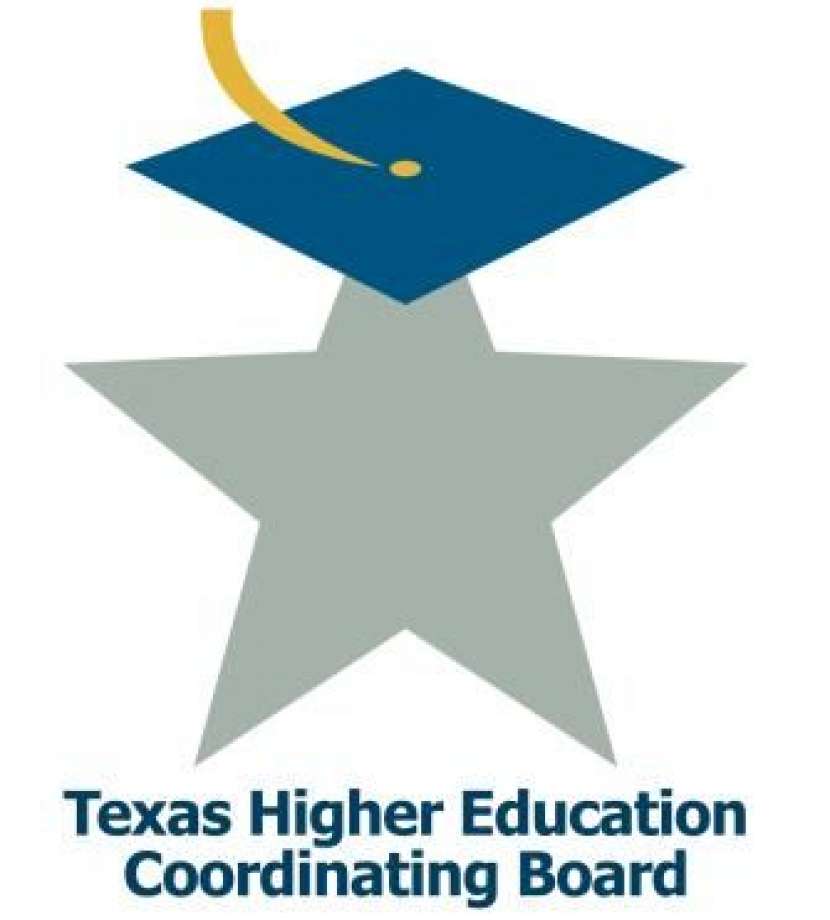
MCC and nine other colleges and universities were recognized as Star Award recipients during THECB’s quarterly board meeting. MCC will be recognized again Dec. 2 during the 2021 Higher Education Leadership Conference in Austin.
The annual Star Awards are presented to institutions implementing exceptional contributions in achieving one or more of the state’s higher education goals. This year, awards recognized institutions’ efforts in response COVID-19.
Criteria for the awards were “a clear demonstration of how the institution implemented strategies to ensure the health, safety, and success of their campus and local community, partnerships with community-based organizations, and the innovative and creative nature of one or more of the strategies used,” according to THECB’s webpage.
“The success of our students was due to their resilience, determination, and talent,” said MCC President Johnette McKown. “Every McLennan employee contributed to student success by tapping into their creativity and expertise to ensure our students had access to all the same services offered pre-pandemic. … The challenge is not over, but McLennan will not give up as we stand McLennan Together.”
MCC’s application provided several examples of the school’s efforts:
— Loaning ventilators, hospital beds, and PPE to community healthcare institutions;
— Developing online self-assessments, self-reporting forms, instructions on exposure and testing, and safety practice modules;
— Maintaining an online dashboard of reported, positive, and active cases updated daily;
— Providing the community with free drive-thru testing and vaccination clinics;
— Designing the “McLennan Together” communication campaign in response to student, employee, and community questions on safety protocols, instructional strategies, and student success activities;
— Implementing instructional solutions to ensure safety and success, including providing online, blended, and hyflex course formats, rotating students attending class in-person, collaborating with local partners on solutions for programs requiring clinical work, simulations, internships, and other in-person instruction;
— Providing creative solutions in response to COVID-19 hardships like a curbside food pantry service, a fundraising campaign supporting emergency fund scholarships, free parking lot WIFI, a technology loan program, and virtual mental health counseling;
— Producing virtual commencement ceremonies for all 2020 graduates; and
— Implementing a student debt-forgiveness program to encourage former students to re-enroll.
Other Star Award recipients were the University of Texas at Arlington, Houston Community College, Texas A&M University – Commerce, University of Texas Health Science Center at San Antonio, Odessa College, University of Texas at Tyler, Sam Houston State University, Texas State Technical College, and Lone Star College – North Harris.
For more information about the awards, click here.
The Act Locally Waco blog publishes posts with a connection to these aspirations for Waco. If you are interested in writing for the Act Locally Waco Blog, please email Ferrell Foster at [email protected].
The City of Waco is receiving $34.7 million in federal COVID relief funds, and city leaders want community input on how to spend a portion of the funds.
Waco received $17.4 million in June from the American Rescue Plan and will receive a second payment next year for a total of $34.7 million.
“The City of Waco intends to use $15 million … for municipal purposes including improvements to infrastructure for Water, Wastewater, and WMARSS as well as for other infrastructure resiliency and backup projects,” says the City’s website.
The city plan also has set aside $17 million to provide direct assistance to households and businesses. The exact use of these funds will be determined based on community feedback using the Balancing Act Tool.
Council Member Kelly Palmer said: “The data collected from the tool will shape how we invest these funds in our communities. … The city will be gathering this data through the end of September.”
English Balancing Act Tool
Spanish Balancing Act Tool
The Balancing Act Tool allows you to allocate the $17 million to various categories of funding utilizing the available funds set aside for these purposes. “If you do not see any area in simulator, please add in your suggestions.”
The American Rescue Plan Act is the $1.9 trillion act signed into law March 11 by President Biden. The Act contained direct relief to citizens, including the $1,400 stimulus checks received earlier this year, and $350 billion for eligible state, local, territorial, and tribal governments to mitigate the fiscal effects stemming from the public health emergency created by the spread of COVID-19. This latter portion is providing the funds now available to Waco.
Meraki Medical Associates LLP will begin offering COVID-19 vaccinations Friday, Aug. 20, at 1001 Dunbar Street in East Waco. The opening is planned in conjunction with August being National Immunization Awareness Month.
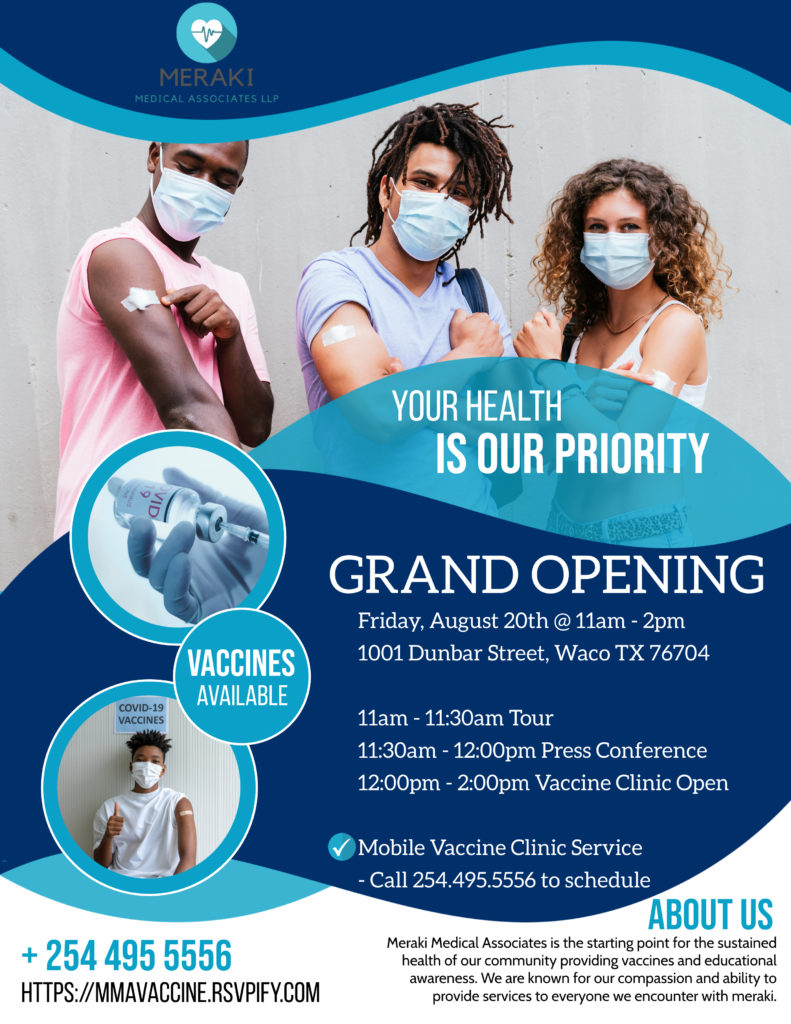
CEO Sophia Strother formed Meraki “to create access and awareness for communities of color in the East Waco,” she said. Meraki is Greek for doing something with soul, creativity, and love. “It’s important to always put something of yourself into what you’re doing, whatever it may be. We are a starting point for the sustained health of our community. We will be known for our compassion and ability to provide services to everyone we encounter with meraki.”
Strother is passionate about helping communities of color fight against COVID. After having over 10 family members directly affected by the virus, she decided she needed to take action. Partnering with Living Word Church of God in Christ, Meraki is set to open its clinic Aug. 20 to provide community-focused health awareness on the importance of vaccine-preventable diseases. It will provide vaccination clinics and educational opportunities statewide that will target underserved communities and special populations.
Meraki is at 1001 Dunbar St., Waco. This building has housed Living Word Church of God in Christ, Meals on Wheels, and Community Food Pantry for all of 20 years. Meraki believes “every person deserves an opportunity to be given a health experience that inspires them and enhances their quality of life. The team hopes to partner with other faith-based organizations, community organizations and corporations to administer vaccinations to individuals 16 years and older.” Sophia is passionate about helping others through faith, knowledge, and resources.
Aug. 20 Events at Meraki
11 a.m. – 11:30 a.m. – Tour
11:30am – noon – Press Conference
Noon – 2 p.m. – Vaccination Clinic
Strother also owns a logistics company and was recently featured on HGTV’s “40 Year Old Property Virgin.” Connect with Sophia online here.
The Act Locally Waco blog publishes posts with a connection to these aspirations for Waco. If you are interested in writing for the Act Locally Waco Blog, please email Ferrell Foster at [email protected].
By Dexter Hall
Definition of divergent
1a: moving or extending in different directions from a common point: diverging from each other divergent paths.
Definition of convergent
1: tending to move toward one point or to approach each other: CONVERGING convergent lines
I have been on a personal journey with family and friends, as well as friends of friends, to ensure they have received their COVID-19 vaccination. I have shared with many that I am “2-Shots In” referring to the Moderna vaccination.
More importantly, I have shared how this is helping me to move past the pandemic, while still using safe protocols. I’m beginning to do the things I enjoy most — things I have been inhibited from doing during the pandemic, such as travel, gatherings, concerts, and many more.
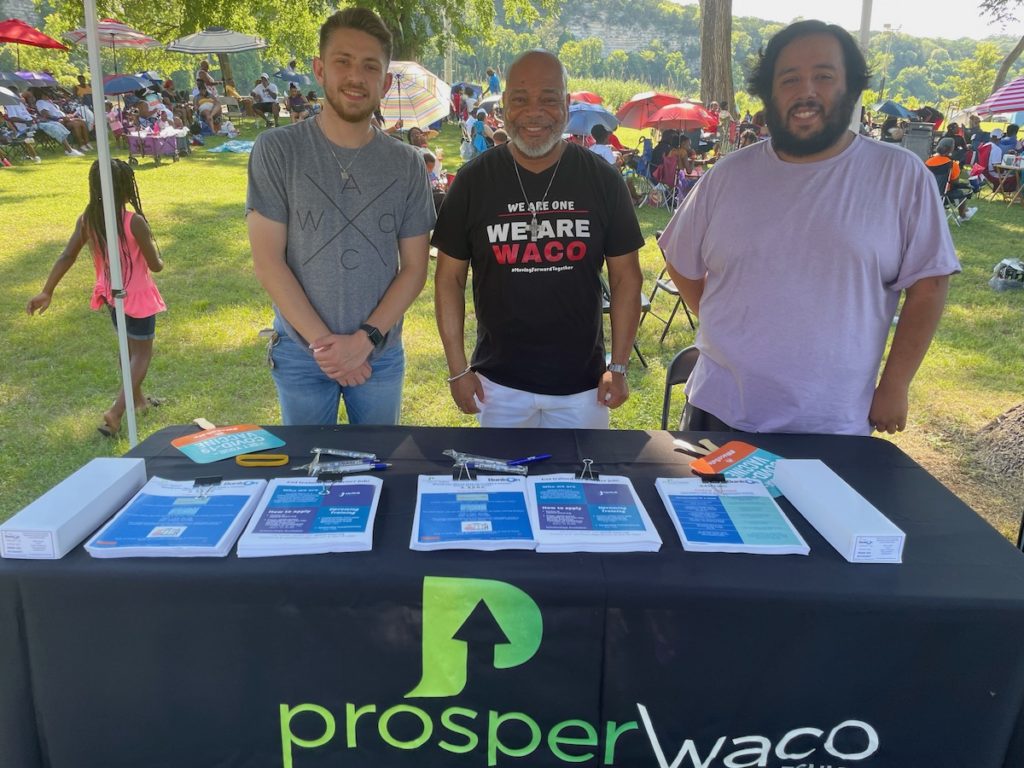
As we all move forward, I ponder which way our community will go and what will be left behind. Are we diverging or converging post-pandemic? Which path will we take?
Financially, each path carries its own weight of issues — some with good prospects and some with not-so-good prospects.
COVID-19 forced us all to work together, to converge, if we were to survive the health and economic apocalypse that could have engulfed us. We worked together for the greater good. During this convergence, COVID-19 helped uncover mass amounts of disparity in our community regarding health, education, and financial and economic security. Some of us were not surprised at all by these disparities because this is and has been our lived experience via work, life, or in my case both.
As these long-held disparities in financial and economic security were displayed openly for all to see, there was a movement or convergence of government, community, nonprofits, business leaders, and others. They came together to develop many initiatives, in some cases first-of-their-kind programming to help the LMI (low-to-moderate income) members of our community. These safety nets ensured the bottom didn’t drop out of our economic floor, which would have been catastrophic for all, including the “haves.”
COVID-19 put us all on a converging path of economic survivability and showed how working together provides a brighter path for our most vulnerable community members and also works for ALL Wacoans.
As we resume our pre-pandemic normal, we tend to diverge, to move away from working together, back to our corners, and away from our common goal of fighting COVID-19. I wonder what will be lost that was gained during our fight. And, as in any war, what will the spoils be?
Will we forget the financial and economic disparities that were put on display as many in our minority communities lost their jobs with no economic safety net?
Will we forget the struggles of our minority small business owners who lacked access to capital prior to COVID-19 and saw greater losses during the pandemic than their counterparts?
Will we forget how they asked for and still need “Targeted Technical Assistance” that works for them and not for the provider?
Will we forget the housing needs of our marginalized community as prices of goods to build housing have soared almost three times their pre-pandemic levels and which will ultimately widen the already wide Black/White housing and wealth gap and also lead to an “affordable rental” issue in our community?
I ask, are we on a path of converging or diverging post-pandemic?
Let us stay the course and “LIVE” like the pandemic is behind us but continuing to “WORK TOGETHER” as if the pandemic was still in front of us. Let us converge, not diverge, in our viewpoints on the economic security for all Wacoans.
At Prosper Waco we are working to address the financial and economic security for our marginalized communities in Waco. We invite you to join us in this fight that ultimately impacts all Wacoans. Please contact me at [email protected] for information on how you can be involved as we are converging together through the “City of Waco Financial Empowerment Blueprint.”
One for all and all for one.
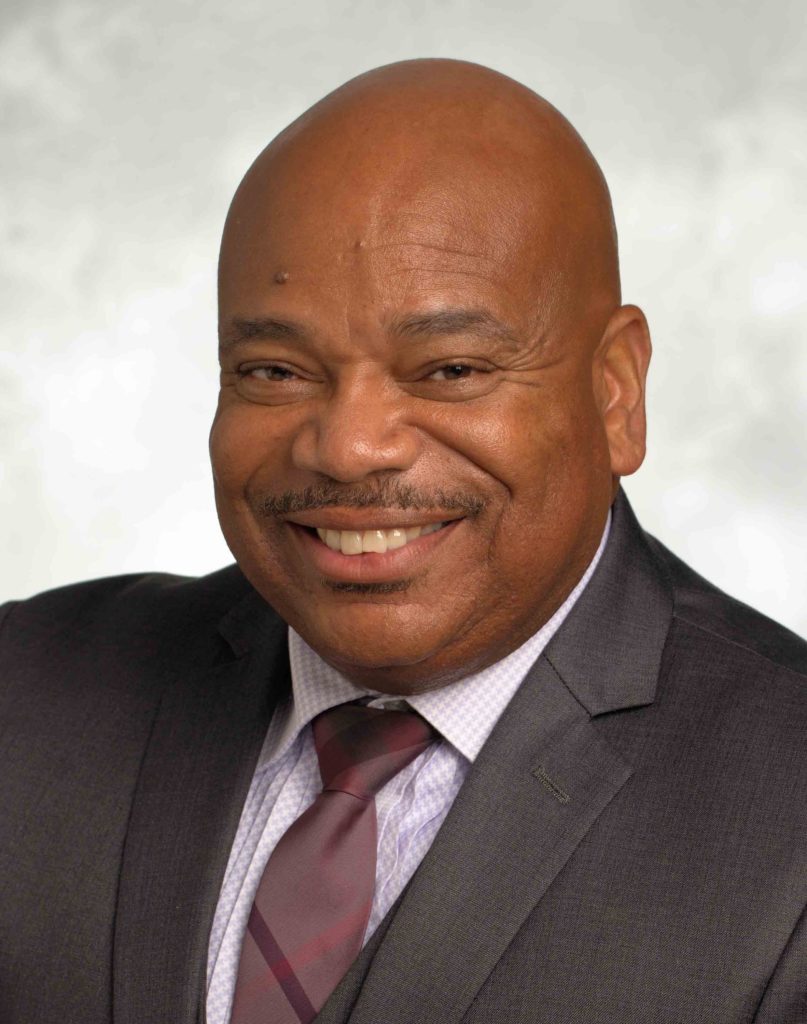
Dexter Hall is chief of staff and senior content specialist for financial security with Prosper Waco. For more information on financial security contact Hall at [email protected].
The Act Locally Waco blog publishes posts with a connection to these aspirations for Waco. If you are interested in writing for the Act Locally Waco Blog, please email Ferrell Foster at [email protected].
By Charles Williams
The Texas and U.S. economies are surging along with the confidence of U.S. consumers as COVID-19 vaccines flood the nation. But the persistence of the coronavirus makes the recovery fragile.
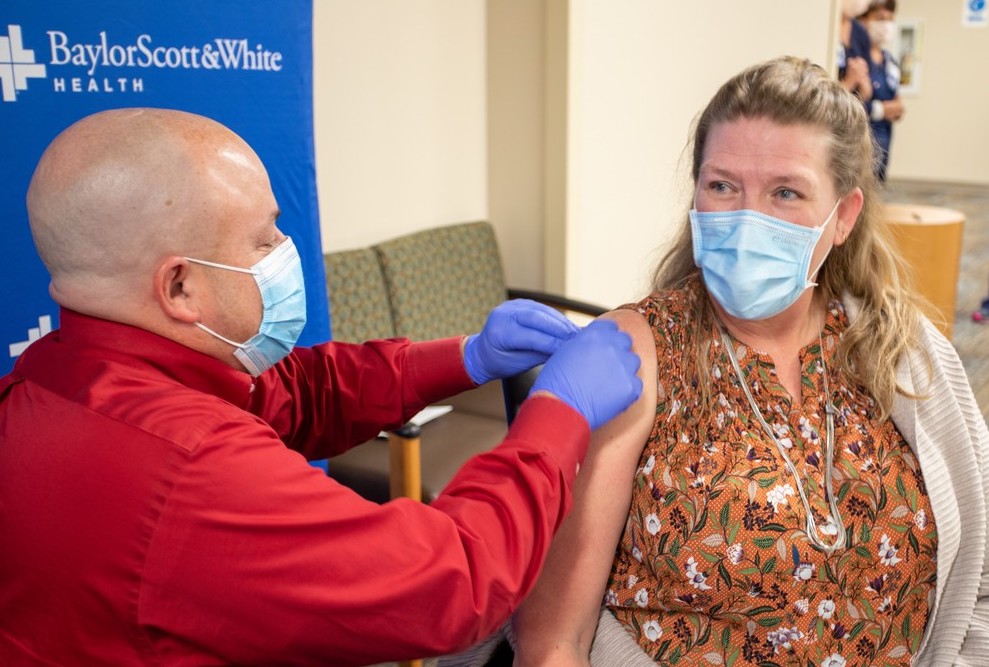
The pace of the U.S. economic recovery in 2021 hinges on the pace of COVID-19 vaccinations.
The general business activity index, which reflects the net share of Texas executives saying conditions improved or worsened, hit an all-time high in April for services companies. Manufacturers’ confidence spiked, too.
In the Texas services sector, indexes on general business activity and company outlook rose to their highest levels since the survey began in 2007. Among manufacturers, indexes for new orders and growth in orders climbed to their highest readings in the history of that survey, according to the Federal Reserve Bank of Dallas.
“All the stars are aligning to have a great recovery,” Luis Torres, research economist at the Texas Real Estate Research Center at Texas A&M University told The Dallas Morning News. “The economy is going gangbusters and the [Dallas Fed] forecast calls for recovering all the lost jobs [in Texas] by the end of the year.”
Texas Comptroller Glenn Hegar recently issued a revised revenue estimate that gives lawmakers several billion more dollars to spend as they wrap up the next state budget. Hegar cited improved performance of the state economy as COVID-19 restrictions began to be lifted over the past two months and immunizations improved consumer confidence. In a letter to Gov. Greg Abbott, Lt. Gov. Dan Patrick, and Speaker Dade Phelan, Hegar said he is optimistic about economic growth because of the rollout of COVID-19 vaccinations in Texas and reopenings of businesses in the state and elsewhere in the U.S.

Nationally, the economy expanded rapidly in the first quarter at a torrid 6.4% annualized rate. Personal consumer spending rose at an equally impressive annualized rate of more than 10%.
Our local area is also participating in the recovery. McLennan County sales and county use tax was up 1.6% in April and 7.7% year-to-date. Waco specifically is up 2.6% year-to-date. Many Texas cities and counties are running deficits compared with last year’s figures.
Despite this, nearly a quarter of U.S. adults say they would still avoid shopping at local businesses or dining inside restaurants after being vaccinated, according to a new national survey by YouGov on behalf of Bankrate. But the economy can’t fully recover until consumers do what they do best in America: buy freely what they want or need.
The key to full return of the local economy is residents’ confidence: How vulnerable am I if I venture out to shop or return to the workplace? How contagious are my neighbors and friends?
Herd immunity — the rate at which enough people become immune to a disease to make its spread unlikely — may be an unattainable goal, experts say. However, the only sure answer is to vaccinate as many people as we can.
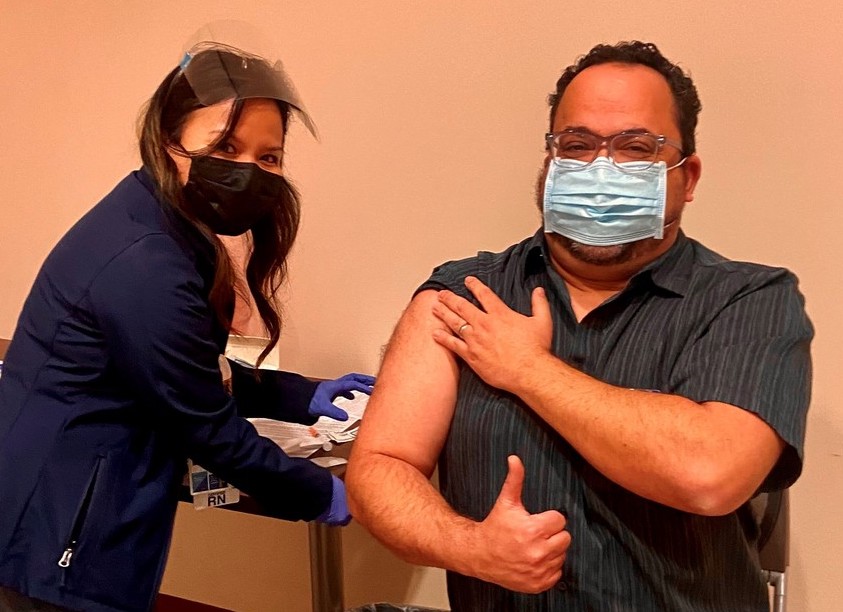
As of May 6, only 24% of McLennan County residents were fully vaccinated. Compare that with the Texas rate of 29% and the U.S. rate of 33%. A CDC assessment looking at hospitalizations in two U.S. hospital networks covering 24 hospitals in 14 states has found that fully vaccinated adults over the age of 65 are 94% less likely to be hospitalized with COVID-19 than unvaccinated adults in the same age group.
Encourage your friends, coworkers, and neighbors to get vaccinated. As more and more acquaintances become vaccinated, hesitancy and resistance will continue to melt. That leads to more consumer confidence and fuels the local economic recovery.
A free online MyBSWHealth account is the easiest way for Waco area residents to schedule vaccine appointments at Baylor Scott & White Health. There are also walk-in appointments available.
Right now it is time to roll up our sleeves and engage our communities to increase vaccination. The health of our community and our economy depend on it.
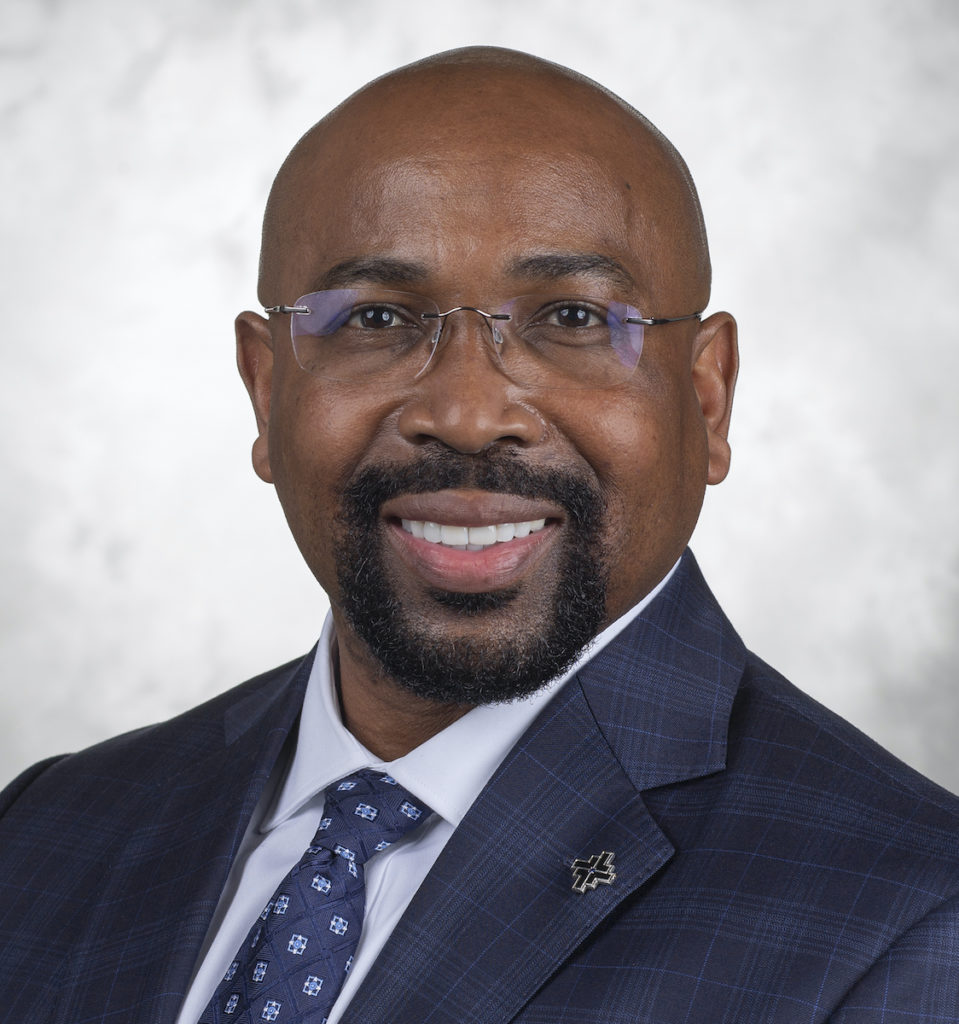
Charles Williams joined Baylor Scott & White in January 2021 as president of BSW – Hillcrest in Waco. Prior to that, he served as president and CEO of Regional Medical Center of Orangeburg & Calhoun Counties in Orangeburg, S.C. Charles is no stranger to Texas, having spent most of his life in the Dallas-Fort Worth metroplex.
The Act Locally Waco blog publishes posts with a connection to these aspirations for Waco. If you are interested in writing for the Act Locally Waco Blog, please email Ferrell Foster at [email protected].
